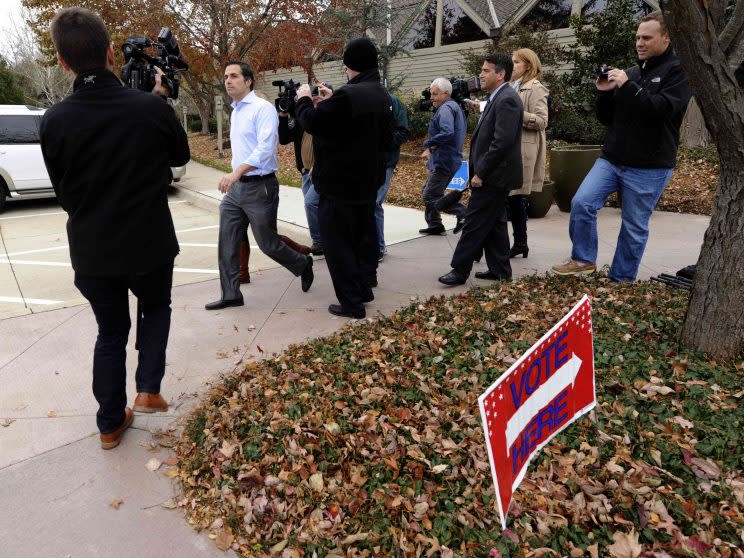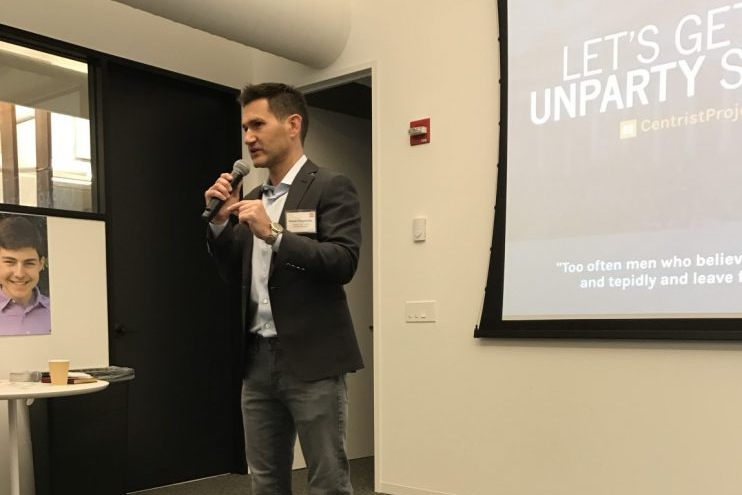Fed up with the 2 parties, a group of centrists rises up

CHICAGO — Shelbi Lewark was a paid field organizer in Colorado for the Republican National Committee until Donald Trump became the party’s nominee for president. Lewark, 26, was so turned off by Trump that she quit her RNC job last summer and is now working to elect independent candidates in the Centennial State.
Owen Casas is a 32-year-old stonemason from Maine who fought in Falluja, Iraq, with the Marines. He tried volunteering in Democratic politics but realized he didn’t fit there or in the GOP. So he ran for the state Legislature as an independent in 2014 and lost, then ran again last year and won.
Shawn Riegsecker is a 44-year-old successful tech entrepreneur in Chicago whose company did work for Barack Obama’s presidential campaigns. But he grew disillusioned with the Democratic Party’s neglect of pocketbook issues. He’s thinking of running for the U.S. Senate in 2020, as an independent.
All three are now part of a group called the Centrist Project, which hopes to tap into dissatisfaction with the two major political parties. The group has a goal: Elect a small band of independents in the U.S. Senate to force compromise between Republicans and Democrats.
About 50 group members gathered here last Thursday for a daylong strategy meeting, hosted at the downtown offices of Riegsecker’s company, Centro. Yahoo News was granted exclusive access to the event.
In a back corner conference room of the massive open-floor office, the attendees heard updates from activists in states where independents have had some success so far: Alaska, Oregon and Maine. And they listened as Joel Searby, a senior adviser on Evan McMullin’s independent bid for president last year, walked them through potential Senate races the group might compete in.
“One example of a place where we’re looking is Utah. So we did some recent polling, and I’m not going to share everything but I’ll tell you that Sen. [Orrin] Hatch is incredibly vulnerable,” Searby said. “Only 21 percent in our survey believe that he should be reelected.”

Searby said his group’s polling also showed a specific independent candidate, whom he did not name, beating Hatch 33 percent to 29. The survey found that 59 percent of Utah voters surveyed believe the political system is “rigged in favor of the well off and well connected” and that “finding common ground” was most important to 51 percent.
“I spent a lot of time there last year,” said Searby, referring to the McMullin campaign’s focus on Utah. “And there is a palpable sense that not only is Sen. Hatch — his time is done — but that it’s time for something different.”
Searby said the Centrist Project is also exploring independent Senate runs in Wyoming, Utah, Nebraska, Texas, Connecticut, Massachusetts and New Jersey.
The project has an uphill battle ahead. A seemingly countless number of independent candidates have vowed to break through the electorate’s political polarization only to crash and burn on Election Day.
But there is some hope: In addition to locally elected officials like Casas, centrist independents have won mayorships, governors’ mansions and even a Senate seat or two. In the Senate today, Sen. Angus King, I-Maine, is aligned with the Democrats, while Lisa Murkowski, R-Alaska, won reelection in 2010 as a write-in candidate after losing her primary, defeating her GOP and Democratic rivals.
Nick Troiano, the Centrist Project executive director who in 2014 ran unsuccessfully for Congress at the young age of 24, said it had raised over $600,000 for early stage operations. He showed a slide with two huge numbers. There were 184 days until their candidate recruitment deadline, he said, and 586 days until the 2018 election. They have attorneys who specialize in ballot access working to ensure they can get candidates qualified to run.
The Centrist Project was founded in 2014 after a group including Riegsecker read a 2013 book by Dartmouth public policy professor Charles Wheelan called “The Centrist Manifesto” and decided to try to put the book’s ideas into action.
In 2014, Kansas businessman Greg Orman put a major scare into incumbent Sen. Pat Roberts, a Republican running for his fourth term. Orman led Roberts by 8 points in September and still had a small advantage in public polling on Election Day, but lost by 10 points. Nonetheless, Orman’s bid was a jolt of confidence for the Centrist Project.
“I think it gave us all some hope that we could actually build a true powerful organization,” Riegsecker told Yahoo News.

Since then, continued dysfunction in Washington and the rise of Trump have pushed others in the direction of the group’s cause.
In 2016, Marc Merrill, the president of a video game company that brought in $1.6 billion in 2015, stumbled across a Facebook advertisement for the Centrist Project. He sent an email through a website form, and a few days later was having lunch with Wheelan. Merrill, who left the Republican Party and registered as an independent in 2012, is now helping to fund the Centrist Project and has joined the operating board.
“As our country has regressed over the past two decades into this combative, polarized environment, the structure of the government is just not functioning as it needs to and we have incredible problems to solve as a society,” Merrill said in an interview. “I’m really in it for the long run. I don’t really care who solves the problem. I just want our country to have more effective governance.”
A few months later, Shelbi Lewark was contemplating her future in politics the day after Trump accepted the Republican nomination in Cleveland. She had worked her way up to regional director for the Republican National Committee and had helped elect Sen. Cory Gardner, R-Colo., in 2014.
She also had deep Republican political roots in her home state of Oklahoma. Sen. James Lankford, R-Okla., baptized Lewark in the Southern Baptist church where he was a youth minister. But once Trump was the Republican nominee, Lewark could not stomach the idea of devoting the next three months of her life to electing him president. And she was not excited about the GOP’s Colorado Senate candidate, Darryl Glenn, either.
“To give 18 hours to a candidate, you have to love them. If we had had a really good Senate candidate, I could have stayed with it,” she said.
But Lewark saw the culture of the Colorado Republican Party changing in response to Trump. “The types of volunteers we were bringing in were not the type of people I wanted to work with. The environment changed drastically from 2014 and Cory Gardner to Donald Trump and Darryl Glenn.”
Lewark started a new job on Friday as the Centrist Project’s state director in Colorado, where the group hopes to make a push in the state Legislature.

And so, after a few years of what Riegsecker described as “investing and creating infrastructure and brand and legal entities,” he said that “now it’s our moment where we feel it’s time to go as big as we possibly can, given what’s going on.”
The Centrist Project’s organizing principles are vague. The group wants candidates to seek cooperation rather than conflict, to represent people before political parties or special interests, and to be motivated by public service rather than self-interest. The messy business of hammering out a more precise agenda or platform will come down the road if the Centrist Project has electoral success. At the moment, it is trying simply to achieve liftoff.
“People may call us crazy,” Riegsecker told the group. “I’m not here for 2017 or 2018. … I’m in this for the next 10 years and the next 20.”
But group members also are realistic in that they want wealthy individuals who can self-fund their campaigns. And they had a few potential candidates already in their midst who told me they are interested in running for statewide office: Orman, who said he may run for Kansas governor in 2018, Riegsecker, who is eyeing a run for the U.S. Senate in Illinois or Ohio, and Katherine Gehl, a Wisconsin businesswoman who has both money and an impressive résumé and is sometimes mentioned for governor or U.S. Senate.
Pat Caddell, a former Democratic pollster who now appears regularly on Fox News, attended the meeting to share research findings. After spending time with the group, Caddell was enthusiastic. “I’m very impressed with the people here,” he said. “That guy from Maine, he is going to be a star.”
He was referring to Casas, the bearded and tattooed lapsed Mormon who speaks excitedly both about beer and the nitty gritty details of local governance. Casas, the father of three young children, represents a district that includes the affluent and Democratic-leaning coastal town of Camden.
Not more than five minutes into watching a video of Casas’ debate last year with his Democratic opponent, I saw the raw authenticity that gave him obvious appeal. When told to wrap up his opening statement, Casas didn’t hide his irritation. He put his arms out and blurted, “Seriously? Already, 15 seconds?” He ran on a message of being “fiscally conservative and socially liberal” and won by just 12 votes out of more than 6,000 cast.
When we spoke on the sidelines of the Centrist Project meeting, Casas said he’d never felt at home in either political party. He tried to volunteer for Maine Democrat Mike Michaud’s gubernatorial campaign in 2014, but balked at the idea of knocking on doors for the Democratic slate of candidates.
“I don’t speak highly of the Democrats. I don’t speak highly of the Republicans. I speak highly of some of their ideas. I like some of the ideas that are generated by these institutional tribes,” Casas said. “That’s one of the great things about the parties: a lot of folks generating ideas that we then debate.”
“I’ve always been an independent,” he said. “Maine’s got a pretty stubborn, independent streak. … We look to our neighbors to help out. We try to help out our neighbors. We try to foster a good community atmosphere. But when that storm sets in, you may be on your own for the next five days. And you gotta have a woodpile. You gotta have a food store. You gotta be able to start a fire. You gotta be independent. Because you never know when it’s coming.”
Correction: Riegsecker is 44 years old, not 45.
Read more from Yahoo News:



